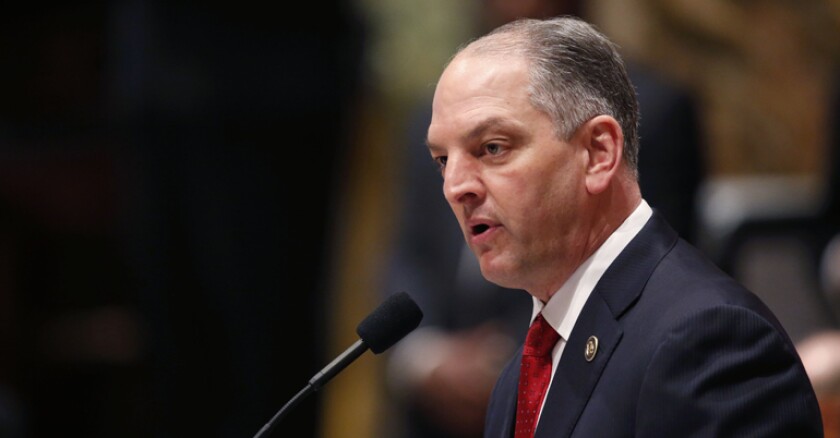Edwards, a Democrat, wants the state to join some of its parishes in suing the oil and gas industry to pay for the restoration of environmentally damaged coastal land. To oversee the case, Edwards decided to hire Taylor Townsend, a former state legislator who just happens to chair the governor’s super PAC. Townsend put together a team of outside attorneys who, collectively, had given Edwards’ campaign $130,000 last year.
Needless to say, this led oil and gas officials to accuse Edwards of cronyism and doling out “massive legal fees for his friends and funders.” But the hiring also needled Jeff Landry, the Republican attorney general who many expect is preparing to challenge Edwards in the next election. Edwards and Landry have been feuding for a while now -- well before the coastal land litigation came up. The attorney general has refused to approve more than 40 state contracts negotiated by the governor in part because of objections to language in the contracts barring LGBT discrimination. Edwards has challenged Landry’s authority to block his deals, but so far the rulings have gone Landry’s way.
So it was no great surprise that Landry would object to Edwards’ hiring some pals for the coastal land suit. In September, he moved to nullify the deal, calling it a violation of a state law restricting contingency legal fees. Edwards countered that the contract actually protects the state financially by denying the attorneys any payday unless they prevail and barring them from taking a percentage of the award. Still, more than three dozen legislators have objected to Edwards’ proposal.
“The issue exposes both a policy and political rift between Edwards and Landry,” says Jeffrey Sadow, a political scientist at Louisiana State University in Shreveport. “The governor drew tremendous monetary support from trial lawyers in his campaign, and this suing strategy permits Edwards to stake out a visible populist position. Landry’s actions also publicize him as standing up to this perceived abuse of power, and serve his policy goal to resist state intrusion on corporate citizens.”
Sadow doesn’t think Landry can prevent Edwards from hiring the lawyers that he wants indefinitely. And for his part, the governor has been unapologetic about offering a contract to political allies. “There is nothing dishonorable about hiring a qualified, competent attorney who happens to be a friend and supporter,” Edwards told The Baton Rouge Advocate. “Since when am I obligated to do business with people who don’t support me?”
Edwards’ critics point out that Townsend doesn’t have experience overseeing a case of this type. But the team the governor has put together is highly qualified, says Dane Ciolino, who teaches legal ethics at Loyola University in New Orleans. “With respect at least to some of those lawyers, it wasn’t raw political payback,” he says. “Many of the lawyers that were chosen by Gov. Edwards were among the first you would call for these sorts of issues.”
If the qualified attorneys happen to have been donors, Democrats say, so much the better. “As far as a governor or attorney general hiring a campaign contributor to work on a state case,” Ciolino says, “that’s a story that’s oft been told here in Louisiana.”









